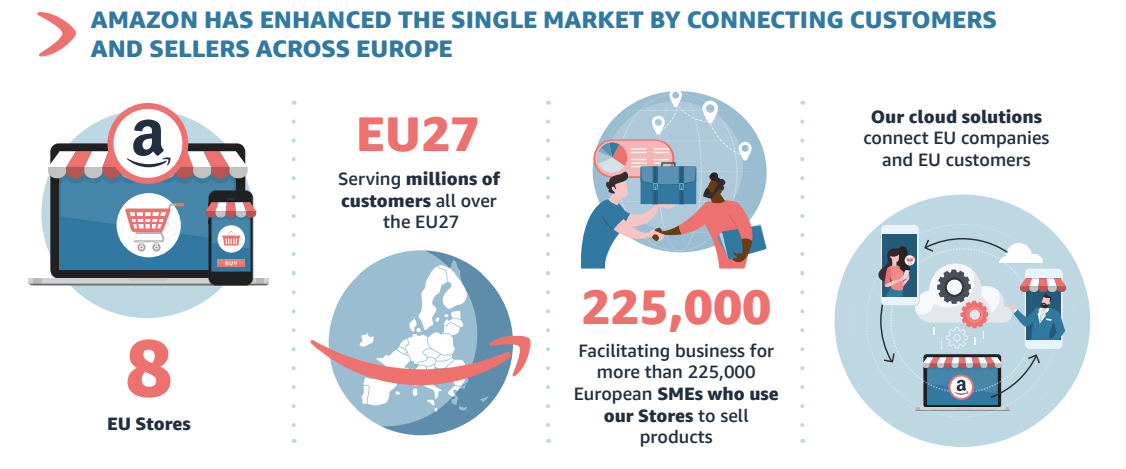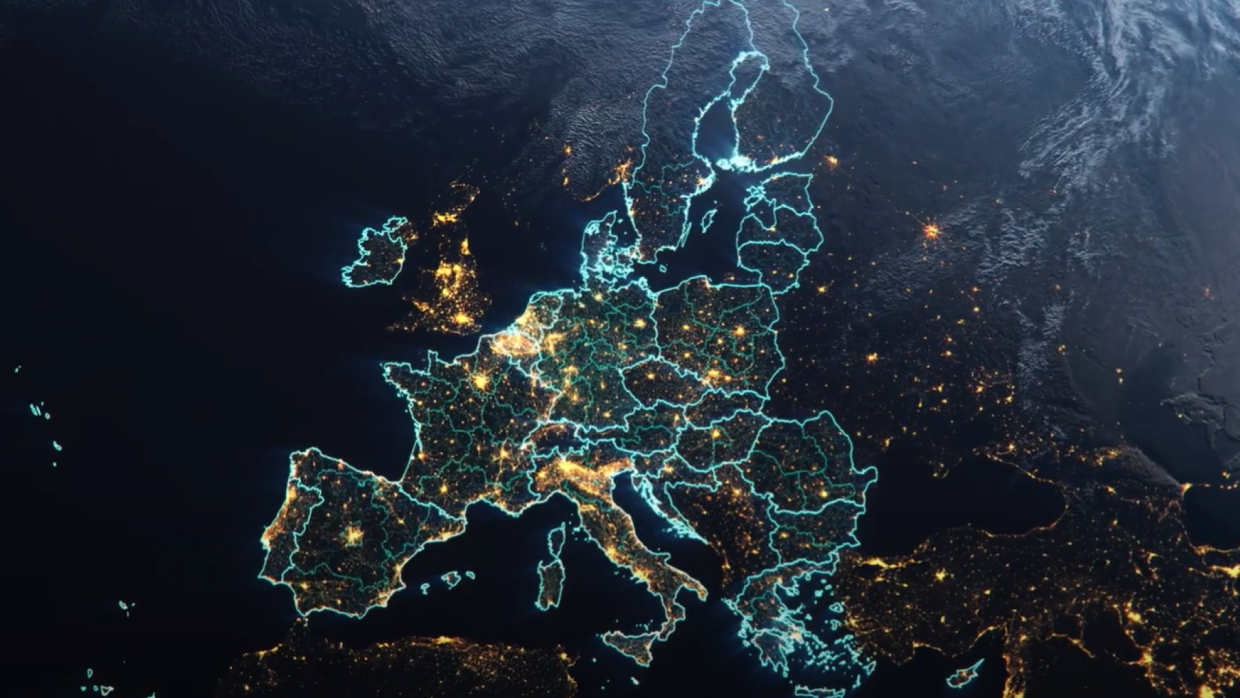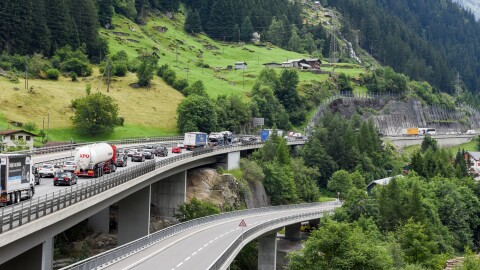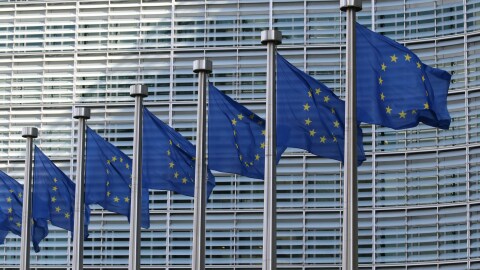The Single Market is described by the European Commission as one of the EU’s greatest achievements, leading to economic growth and making everyday life for European businesses and consumers easier. It is clear that the deeper the integration of the European Single Market, the more effective the results for Europe.
Amazon launched its first European Store in Germany in 1998, when the Single Market was in its fifth year. Since then, Amazon has worked hard to facilitate the free movement of goods and services across Europe, and has invested more than €150 billion in the European Union since 2010. Amazon has also been quick to nurture European developments; one example is the acquisition of a text-to-voice Polish start-up that powered the "Text-to-Speech”, "Voice Guide" and "Explore by Touch" features, which have informed the development of Alexa and other devices.
Our Contributions
We take pride in being a Single Market champion for European customers and SMEs
Amazon has enhanced the Single Market by connecting customers and sellers across Europe. We now have 8 EU Stores, which serve millions of customers all over the EU27 and facilitate business for more than 225,000 European small and medium-sized enterprises (SMEs) who use our Stores to sell. Our cloud solutions connect EU companies and EU customers without boundaries.

We boost EU competitiveness by supporting economic resilience in the EU
Through our ready-made and pay-as-you go Store and cloud solutions, we make it easier for European SMEs to operate in Europe, as well as empowering them to compete internationally. In turn, we are proud to say that SMEs supported by Amazon have achieved over €14.5 billion in exports in 2021. To support SMEs beyond Amazon’s own parameters, we have created partnerships with European public sector and third-party partners to create programs that teach digital skills and promote exports. For example, the educational initiative called the Swedish E-Commerce Academy was launched in conjunction with Business Sweden, Almi Företagspartner Skåne and PostNord, and is creating Sweden's leading training platform for e-commerce. Amazon’s economic impact goes beyond just Amazon itself. Our activities have created more than 150,000 direct jobs - with employees spread across 20 EU Member States - and more than 650,000 indirect jobs via European SMEs.
We help overcome internal market barriers
We support the EU’s ambition of a unified internal market by making cross-border commerce easy for small businesses. Our e-commerce and cloud computing solutions are standardised across the EU and allow seamless EU-wide business operations. For example, sellers can use one account and interface with 8 EU Stores, and use one logistics network to access all of Europe. In addition, Amazon helps sellers by offering localised customer services (including after sales service) and returns, as well as payment processes and the Build International Listings (BIL) tool, which lists seller products in the local language across our European Stores. Amazon also partners with tax providers to offer low-cost VAT solutions for easy compliance with local differing VAT requirements.
We help advance the Single Market through the green and digital twin transition
The digitalisation of retail helps unlock the Single Market via increased access to international customers, as well as growing business and enhancing international competition. At Amazon, we can use our e-commerce expertise to help craft a Single Market for retail, which reflects the diversity of online and offline sales channels in today’s retail environment. Amazon also helps scale sustainability initiatives across Europe; for example, the more than 3,000 electric delivery vans that in 2021 delivered more than 100 million packages to customers’ doorsteps across Europe. In the next five years, Amazon will go even further, more than doubling our European zero-emission fleet - bringing it to at least 10,000 electric delivery vans and more than 1,500 electric heavy goods vehicles. This represents a commitment from Amazon to invest more than €1 billion to electrify and decarbonise our transportation network across Europe.
This content is hosted by a third party (www.youtube.com).
To view the content, you need to consent to cookies by selecting Accept all in the popup banner. Or you can go to the site footer, select Cookie Preferences, and then select On under Functional Cookies, Performance Cookies and Advertising Cookies.
Our Priorities to Develop the Single Market
The Single Market has been effective for 30 years because it has provided an attractive and stable investment environment for European and multinational firms. It has allowed companies to scale with legal certainty, it has provided larger choice for consumers, and it has ensured the European economy remains productive and competitive. But more rigorous harmonisation and enforcement are needed so that it can reach its full potential.
Strengthening EU competitiveness
We welcome a future strategy for the Single Market, which returns to the ambition of a competitive and resilient economy. We believe that the key success factor to advance the Single Market, to equally benefit consumers and businesses, is through objective implementation and enforcement of Single Market rules. This will ensure that businesses can deploy the latest technologies and that customers benefit from a wide range of products and services.
Removal of internal market barriers
Internal trade barriers continue to hinder the free flow of goods and services in the EU. Simplified, streamlined policies across EU Member States are required to fully unlock the potential of the Single Market, especially for small companies with limited resources. We advocate for the removal of remaining barriers for businesses operating in the EU, and in particular for SMEs who operate on our Stores. Some areas for improvement are:
- Expand the single VAT registration concept to inventory movements across EU borders: Under the current EU VAT system, businesses that store inventory outside of their home country in order to better reach international customers have to register for VAT in every country in which they store and sell goods. The EU Commission’s recent VAT in the Digital Age proposals includes an extension of the ‘VAT One Stop Shop’ portal, allowing businesses selling to consumers and holding stock in another EU country to register VAT only once and to fulfill their pan-EU VAT obligations via a single online portal. For SMEs looking to expand across the EU, the removal of VAT administrative roadblocks can be a game-changer. We support these proposals and are fully committed to working with EU Member States to reach an agreement as soon as possible, so that SMEs can make better use of the Single Market.
- Harmonise sustainability legislation across the Member States: The urgency of the green transition has caused Member States to move ahead at different speeds and in different directions. This has created differing compliance requirements, especially for SMEs seeking to operate across borders. We would welcome a comprehensive strategy to create a Green Single Market to improve effectiveness of waste and recycling across Europe. This would help facilitate Green Deal targets and help SME compliance, particularly in cross-border trade.
- Recognise digital labelling as a complement to physical labelling: Physical product labels have limitations in terms of durability, as well as their level of detail and timeliness of information. In addition, localisation requirements are resource intensive, especially for small companies. Digital labelling is a flexible, efficient, and scalable solution to address this challenge, which would benefit consumers, businesses, and authorities, whilst facilitating cross-border trade in the Single Market. We would like to see the recognition of digital labelling as a supplement to physical labelling.
- Cross-border transportation – Accelerating the deployment of a seamless European network for alternative fuels infrastructure for heavy goods vehicles is a crucial element in the EU-wide decarbonisation of road freight. Amazon is committed to the development of zero-emission trucks and is calling for EU and national policy makers to agree and deliver on ambitious targets for electric and hydrogen charging and refueling stations. To ensure such vehicles can travel freely, such infrastructure is needed across the entire European Union.












